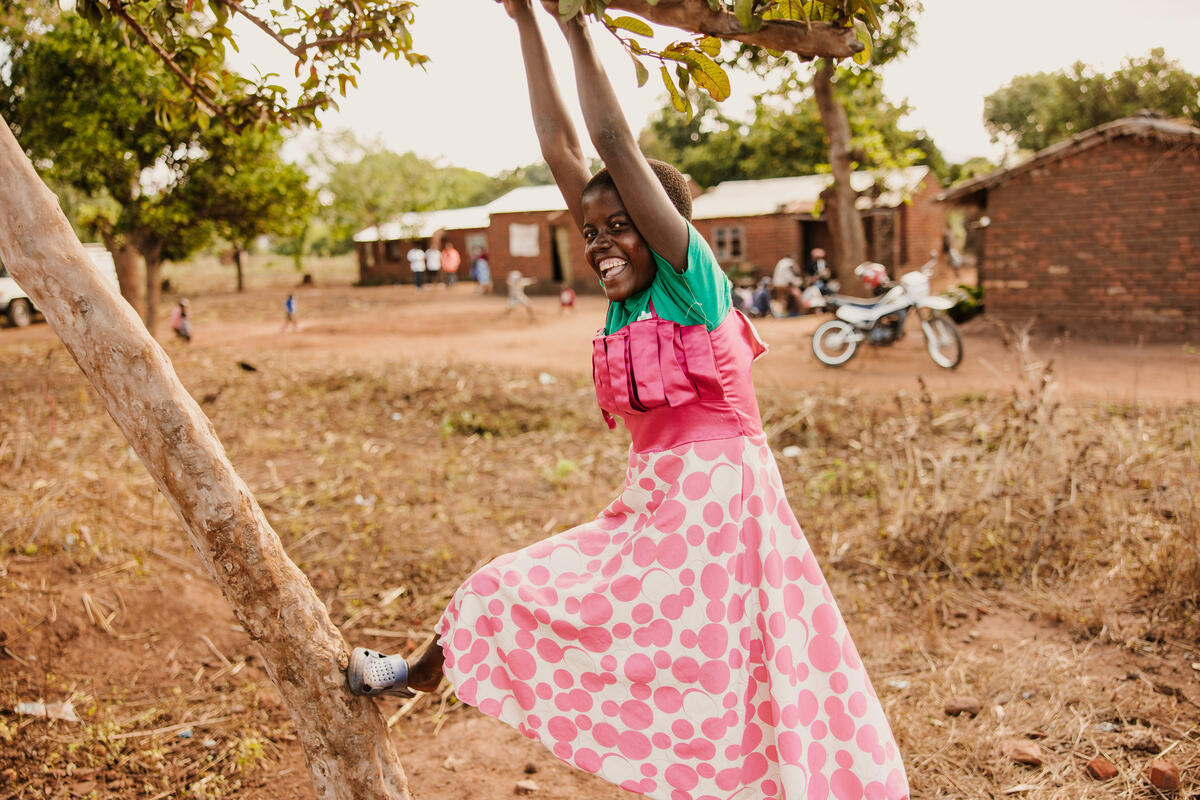
Overcoming challenges through sponsorship
Leon remains determined to work hard and become a journalist.
As a girl growing up in Kapeni, in southern Malawi, 12-year-old Leon is used to challenges – but the last couple of years have redefined what difficult can really mean for her family.
First, there was the drought. Droughts aren’t uncommon in Kapeni, but for Leon’s family of seven, who survive from the money her mother Alefa earns by buying vegetables from a wholesaler and selling them in the market, rainfall is a key factor in the rise and fall of their income.

“Water is the biggest challenge here … sometimes we run out of water in the dry season, and then we have to walk kilometres to the river, or to another village to use the borehole there.” Leon explains.
“There wasn’t enough rain, so there is not enough food. Sometimes I have to go to school without eating because we don’t have enough food.”
Then came the train of cyclones that hit Malawi in January, March and April 2022, causing devastating flooding that wiped out thousands of hectares of crops. Water problems – this time, far too much of it – again threw the family into turmoil, making it hard for Alefa to find vegetables to resell, much less for the family to eat.
At the same time, global economic pressures triggered by the conflict in Ukraine combined with the local disasters with devastating effect on Malawi’s agriculture industry – national production of maize, a staple food and export crop, dropped by almost 20% for the year as the drought, cyclones and rising prices of fertiliser took a heavy toll. The confluence of events forced the prices of the tomatoes that Alefa buys up, reducing her sales as well as her profits and slashing the family’s income.
A year later, in March 2023, Malawi was hit with a cyclone again – Cyclone Freddy, one of the longest-lasting tropical cyclones on record, which smacked back and forth between the southern African coastline and Madagascar for more than a month and caused more than 1,000 deaths and the displacement of more than two million people. Homes, roads and other essential infrastructure were lost as floods and mudslides swept over the country, and thousands more lives were threatened by the deadliest cholera outbreak in Malawi’s recorded history.
“I’m a single mum and life is hard; we don’t have enough money,” says Alefa. “I sell tomatoes or okra that I buy. But right now, I can’t sell as much as I need too, and so I don’t make enough money.”
For girls like Leon, the wave of disasters threatens not just her present, but also her future.

“It is affecting lots of kids at my school. Lots of children don’t come to school because they are hungry, so they just stay at home instead,” Leon says.
While disasters affect everyone, they don’t affect everyone the same way. Women and girls face greater risks to their lives, security and livelihoods when natural disasters strike. In disasters like droughts, girls are more likely to miss school because they are expected to collect water and the longer distances they need to walk to do that increase their risk of sexual assault. Women and girls are also usually expected to be caregivers for others in their families, and so are more likely to sacrifice food and other things that are scarce in disasters. They are also more vulnerable to loss of livelihoods, domestic violence, child marriage, sexual assault and female genital mutilation, all of which can increase in times of disaster. Each one of these threats has tragic consequences that can shape a girl’s possibilities for life.
“Child safety is a problem here. Some children have to walk long distances to get to school, and then it is very dangerous for them. Sometimes they are attacked on the road,” explains Leon.
But Leon and her family don’t face their challenges alone. Leon is sponsored and it is a lifeline for their family, and the whole community, in difficult times like this.
To help diversify their income and build financial resilience, child sponsors have provided Leon’s family with four goats to breed and sell. Other families received goats too, and each household agreed that the first goat born would be gifted to another family, helping the whole community to become more financially secure.
Sponsorship has also provided agricultural training and seeds to help boost food harvests and nutrition training to help families improve their diets and health.
“World Vision has talked to us about lots of important issues through community meetings, there were many things we did not know,” says Alefa.

Leon and the other kids are learning important skills too.
“Before I didn’t know how to protect myself, but now I have learned about child protection and my rights,” she says.
“I join in a youth group where we talk about these things, and also meetings where World Vision volunteers and staff come and talk to us at school to teach us things, like why we should avoid child marriage.
“We are learning how to look out for each other, and report it when something bad happens to children.”
Despite all the troubles that the last few years have brought, Leon and Alefa can see things changing for the better in Kapeni, bit by bit, day by day. It’s a trajectory that Leon wants to see continue, and she is determined to do her part.
“I want to be a journalist when I grow up, so I have to work hard in class,” she says. “I want to tell the stories of what is happening in my community and other places because I want to see things change.”
Girls like Leon are the first to suffer when disaster strikes. You can fight for their rights – sponsor a child today.
1,000 girls urgently need support by October 11th, International Day of the Girl.
